Construction Funding, New School Board Bring Changes, Optimism to Austin Public Schools
By Keaton Peters
Reporting Texas
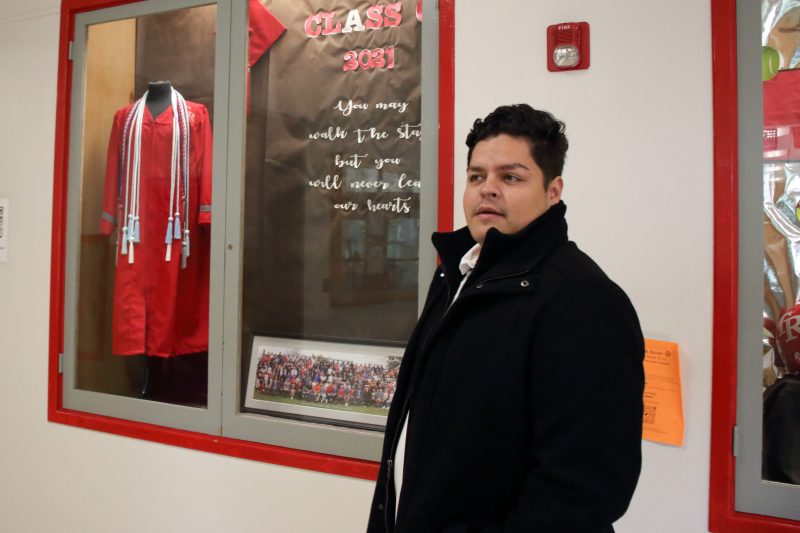
Travis Early College High School Principal Erick Posadas wears a coat to keep warm after a heating unit went offline at Travis High in November. Keaton Peters/Reporting Texas
It’s a chilly mid-November day at Travis Early College High School in South Austin and Principal Erick Posadas wears a thick black jacket as a portable heating unit hums in the background. The building’s heating system had been offline for about two weeks.
Travis High was built in 1953, making it the oldest high school in South Austin, and the broken heating system was hardly the first issue to arise in the aging facilities. Nonetheless, Posadas believes the community has love for the school.
“The heart of Travis has a pull,” Posadas said. “Everybody knows about Travis and has a connection to it.”
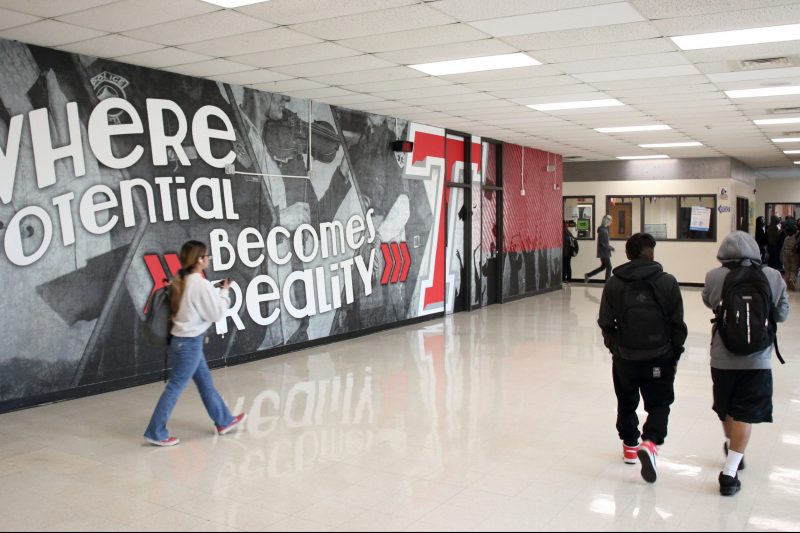
Students walk through the halls of Travis Early College High School which will eventually be replaced by a new facility courtesy of a bond package that passed in November. Keaton Peters/Reporting Texas
The school will soon get a major renovation to fix much more than the heating. The Austin Independent School District is set to receive $252 million to construct a modern facility completely replacing the old Travis High.
The renovation of Travis High is part of $2.44 billion in bonds that Austin voters approved in November, when they also elected five former teachers to the district’s board of trustees. With the district facing stagnant state funding, a teacher shortage and decreased enrollment, AISD leaders see the election results as setting a new course for Austin public schools.
“The community said they are willing to pay to improve our schools, but simultaneously they said they want new leadership on the board to guide this money,” said Ken Zarifis, president of Education Austin, the labor union for Austin school employees.
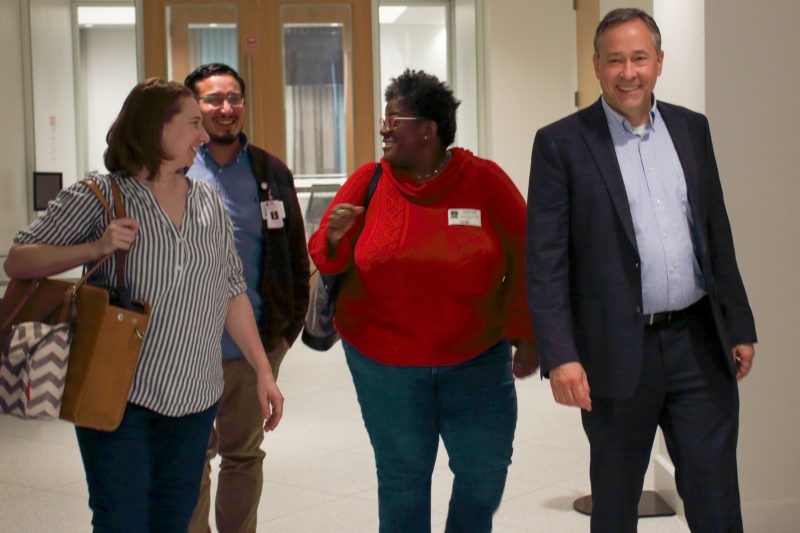
Former teachers and newly elected AISD Board of Trustees members Kathryn Whitley Chu, from left, Andrew Gonzales, Candace Hunter and David Kauffman chat at AISD headquarters in Austin, Texas, following a training for new school board members. Keaton Peters/Reporting Texas
All five of the candidates Education Austin endorsed won their races for school board. Zarifis said the previous administration was “tone deaf” and created “tension and acrimony” with the community, and public school workers “didn’t feel they were being listened to.”
“Former teachers bring an understanding of life in the classroom,” said David Kauffman, one of the newly elected AISD board members.
Kauffman is a former teacher with experience in bilingual education, and he predicted the new board will want more “oversight of educational programs,” with the aim of improving special-education and bilingual-education programs.
Andrew Gonzales, a former teacher at Travis High, won his race for the school board in November to represent parts of South Austin including Travis High. While working there, Gonzales said he encountered heating and air conditioning problems, water damage and animals living in the ceiling.
“All of those things will significantly impact how students feel when they go to learn,” Gonzales said, noting that teachers and staff are also affected.
Candace Hunter is a parent and former teacher in the district, and she was elected to the school board to represent a large part of East and Northeast Austin. Hunter praised the way the bond steering committee prioritized long-neglected campuses in her district.
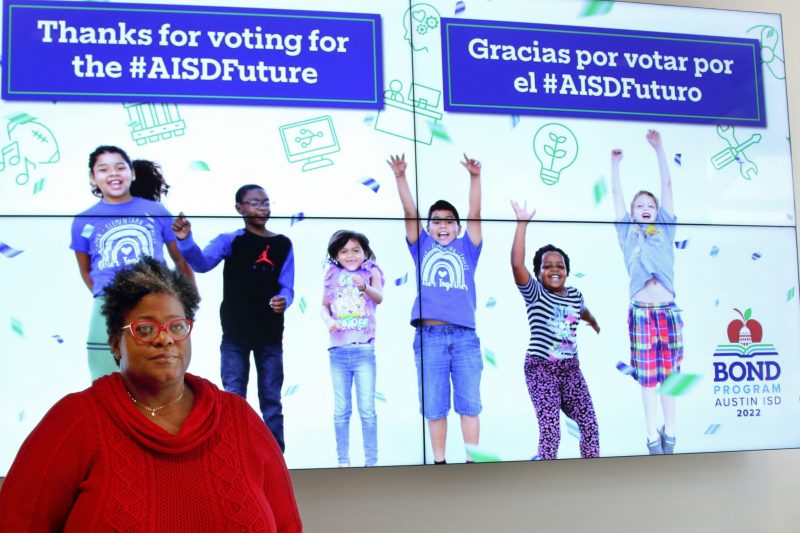
Former teacher and newly elected AISD school board member Candace Hunter stands in front of a banner celebrating passage of the $2.44 billion bond to fund public school renovation and repair at district headquarters. Keaton Peters/Reporting Texas
Austin school district Chief Financial Officer Ed Ramos said every campus will see security improvements such as the installation of perimeter fencing, a more streamlined lock and key system and the construction of “security vestibules” which ensure that visitors have to check in with school personnel before they can enter the building.
In addition to improving school safety, Ramos said the district is focused on teacher retention. AISD has not been immune to the teacher shortage facing Texas, with between 150 and 200 vacancies out of about 6,000 positions at the start of the 2022-23 academic year.
Travis High, however, was fully staffed, and Principal Posadas credits the excitement over the bond money as one reason teachers are sticking around.
Gonzales prefers not to call it a teacher shortage because “there are a lot of teachers out there who could be teaching. They’ve just decided not to,” and improving working conditions and raising compensation could bring teachers back.
The average teacher salary in the district is just over $55,000, and the average hourly wage for non-instructional employees like bus drivers and custodians is $21. Ramos told Reporting Texas that the school district needs to “offer an aggressive compensation increase this coming school year, or we’re not going to be able to retain our employees.”
AISD raised its minimum wage from $13.50 to $16 in 2022, but the new school board members were in agreement that all wages needed to be increased to keep up with inflation and the high cost of living in Austin.
Outgoing board president Geronimo Rodriguez oversaw that increase but said he would like to see the new board raise the minimum wage further to at least $20 an hour.
Speaking about the new board, Rodriguez cautioned that “everyone comes in thinking they’re going to make some massive changes in the school district,” but he added, “we’ve set them up for success, and now it’s their turn to lead.”
Hunter sees raising wages as one part of the board’s broader goal to “stop the flow of parents and teachers out of AISD.”
Under Texas tax law, Austin sends an estimated 53% of local property tax revenue to the state, totaling roughly $846 million, and only a set amount of money per enrolled student, known as the basic allotment, stays to fund the district. Whenever AISD loses a student to private school or suburban school districts, the district loses money it needs to pay staff.
Hunter said she hopes the Texas Legislature will raise the basic allotment during its 2023 session.
“I will go to the Lege and meet with every single rep and senator that I can. We will have to battle it out,” Hunter said.

Kathryn Whitley Chu, who was recently elected to the AISD Board of Trustees, pauses at district headquarters following a training session in November. Keaton Peters/Reporting Texas
Kathryn Whitley Chu, who was elected to represent Northwest Austin on the school board, said she is hopeful that the basic allotment could be raised because Texas lawmakers from both sides of the aisle “want more money for their kids.”
Texas currently has a $27 billion budget surplus going into the 2023 legislative session, but rather than invest in education, Lt. Gov. Dan Patrick intends to use the surplus to lower property taxes and build more power plants, according to a report from KUT.
Even if the Legislature does not raise the basic allotment, AISD intends to use long-term savings from the $2.44 billion bond to increase employee wages.
Ramos said the district spends $12 million per year on “facility repairs,” including $1.7 million just on portable HVAC rentals to keep aging buildings cool in the summer.
Ramos estimated future savings from upgraded HVAC systems, more energy-efficient buildings and lower repair costs will be significant enough to invest back into employee compensation.
“The goal of the district is to move those savings to compensation for our teachers,” Ramos said, but he added it would take several years for those savings to be realized.
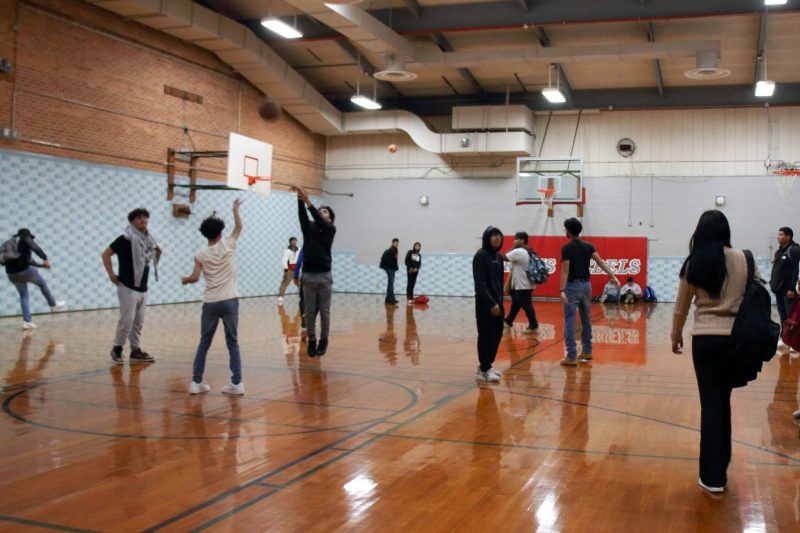
Students use the old gymnasium at Travis Early College High School which was originally built in 1953. Posadas, the principal, hopes the renovations will fix the public’s perception that the school has a discipline problem. Keaton Peters/Reporting Texas
Gonzales, Whitley Chu, Kauffman and Hunter all said they support using future savings on facility maintenance to increase employee wages.
In the meantime, passage of the November bonds has raised optimism among district leaders, especially at Travis High, where 82.6% of students are Hispanic, 9.5% are African American and 83.8% are defined as economically disadvantaged, according to the Texas Education Agency.
Even though Travis High has steady enrollment and a 95% graduation rate, Posadas said “people think its a school with discipline problems,” and he hopes the physical renovation will “fix the perception of Travis High School.”
“People think the building is a reflection of the quality of instruction that’s occurring and the quality of the students that we have and the quality of the teachers and the staff that work here and that’s not the case,” Posadas said.